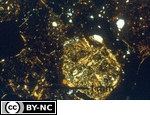Download Image
5.24 MB

ID # 165
Outer crust of a Macrotermes herus (termite) moundFrom the Soil Micromorphology Slide Collection
STEM Standard addressed: ESS2E - Biogeology
Appropriate Grade Level(s)
- College-level
- Classroom Lectures
- Laboratory Activities
- Soil Microbiology
Description of slide: Spheroidal pellets made by M. herus termite species to protect the mound. Central pellet is built from subsoil material, the darker pellets contain more opaque volcanic materials. All the pellets have relatively few skeleton grains most of which are unweathered.
There is a distinct plasma separation around the pellets (vosepic or porostriated b-fabric). Several sesquioxidic nodules with sharp boundaries were found within the pellets. Pores that are created by welding of pellets are typically mammilated metavughs.
Data for the horizon
Horizon sampled: Outer crust of termite mound. Pellets are made of material from the solum and C horizon.
Depth sampled: 0-2 cm
Physical and chemical data available: Particle size distribution: 1 1 % sand, 27% silt, and 60% clay; pH 7.3; organic carbon 0.93%; pores larger than 12 urn is about 13.4%. See reference for more information.
Data for thin section
Preparation of sample: Air dry
Impregnating medium: Vestopal-1 50
Thickness of section: 25 µm
Soil Classification
F.A.O.: Humic Cambisol
Elevation: 1402 m
Parent material: Tertiary volcanics
Soil climatic data and/or soil water balance: Mean annual temperature 230C; mean annual precipitation 600 mm
Vegetation: Acacia shrubs
There is a distinct plasma separation around the pellets (vosepic or porostriated b-fabric). Several sesquioxidic nodules with sharp boundaries were found within the pellets. Pores that are created by welding of pellets are typically mammilated metavughs.
Data for the horizon
Horizon sampled: Outer crust of termite mound. Pellets are made of material from the solum and C horizon.
Depth sampled: 0-2 cm
Physical and chemical data available: Particle size distribution: 1 1 % sand, 27% silt, and 60% clay; pH 7.3; organic carbon 0.93%; pores larger than 12 urn is about 13.4%. See reference for more information.
Data for thin section
Preparation of sample: Air dry
Impregnating medium: Vestopal-1 50
Thickness of section: 25 µm
Soil Classification
F.A.O.: Humic Cambisol
Elevation: 1402 m
Parent material: Tertiary volcanics
Soil climatic data and/or soil water balance: Mean annual temperature 230C; mean annual precipitation 600 mm
Vegetation: Acacia shrubs
Method
Data for 35-mm slide
Frame length: See bar scale on slide
Light mode: Cross polarized
Frame length: See bar scale on slide
Light mode: Cross polarized
References
Mermut, A. R. , M. A. Arshad, and R. J. St. Arnaud. 1984. Micropedological study of termite mounds of three species of macrotermes in Kenya. Soil Sci. Soc. Am. J. 48: 613-620.
Source - A. R. Mermut
Slide BF21. Soil Science Society of America, 1993. A Reference Slide Collection for Soil Micromorphology. SSSA, Madison, WI.
Source - A. R. Mermut
Slide BF21. Soil Science Society of America, 1993. A Reference Slide Collection for Soil Micromorphology. SSSA, Madison, WI.
Peer Review: Yes
Credit this item to: SSSAMedia Date: 1993-01-01
Provided By: (SSSA) Soil Science Society of America
Author(s)/Creator(s)
-
* Soil Science Society of America
SSSA
Submitted By: (SSSA) Soil Science Society of America
Keywords
- Biological Features
- : Outer crust of termite mound. Pellets are made of material from the solum and C horizon
- micromorphology
- Macrotermes herus (termite) mound
Comments
Please login to submit a comment.
Log In to your account
Already a member, certified, or existing customer?*
* Cookies must be accepted to log in.
Not sure if you have an account?
Check Your Email
Join Us!
Connect with members and access the information you need.
Learn more.
Ready to Join?
If you have an account, login on the left. Not sure if you have an account or need to create one? Check your email with the link above. We look forward to welcoming you.